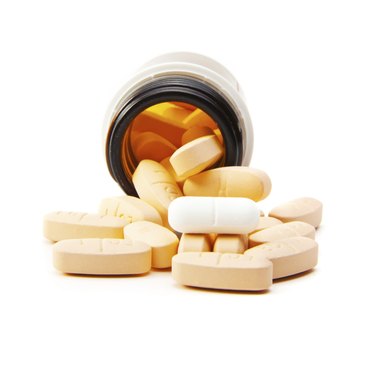
Sterols, also known as steroid alcohols, are a class of chemicals that play multiple important roles in the body. They have parts that can dissolve in fat-like molecules and parts that can dissolve in water. The most widely known human sterol is cholesterol, which serves as a precursor to steroid hormones and fat-soluble vitamins. Some people take plant sterols -- such as vitamins A, D, E and K -- as supplements.
Cell Signalling
Video of the Day
Cell signalling refers to the ability of the cell to effectively communicate -- important because cells in any given organ or tissue work together, and cells often need to signal distant organs as well. Sterols play a vital role in cell signalling by helping regulate the process of development. In addition, they pass on messages received from outside the cell to effect changes inside the cell. In this capacity, they are known as second messengers. They also act as steroid hormones, which are molecules that are synthesized by hormonal organs to signal distant organs. Some of the more common steroid hormones are cortisol, aldosterone, testosterone and estrogen. Cortisol is a stress hormone, aldosterone regulates mineral balance in the body and testosterone and estrogen are male and female sex hormones.
Video of the Day
Fat-Soluble Vitamins
Fat-soluble vitamins, including include A, D, E and K, are synthesized by other organisms from sterols and then passed on to the body in your diet. Vitamin A is important for eye and skin health. Vitamin D has many functions, including helping the immune system and strengthening bones. Vitamin E is an antioxidant that helps protect against cellular damage. Vitamin K is important for blood clotting.
Membrane Stability
Sterols, particularly cholesterol, are integral to the stability of the cell membrane. The membrane is the outer covering of the cell, analogous to the skin. Chemically, it is called a lipid bilayer; lipids refer to fat-like molecules that function to keep the environments inside and outside the cell separate, and bilayer means there are two layers. The cholesterol embedded in the membrane maintains flexibility, or fluidity, and hence stability to the membrane over a range of temperatures.
Phytosterols
Phytosterols are found in plants and are ingested when plant foods are eaten. Some people take concentrations of plant sterols. A 2003 study in the "American Journal of Clinical Nutrition" showed that sterols may interfere with the absorption of excess cholesterol from the diet and therefore may be good for the heart and blood vessels. However, the long-term effects and side effects still need to be established. Consult a health care professional regarding dietary and health decisions, including adding supplements to your regimen.
Is this an emergency? If you are experiencing serious medical symptoms, please see the National Library of Medicine’s list of signs you need emergency medical attention or call 911.